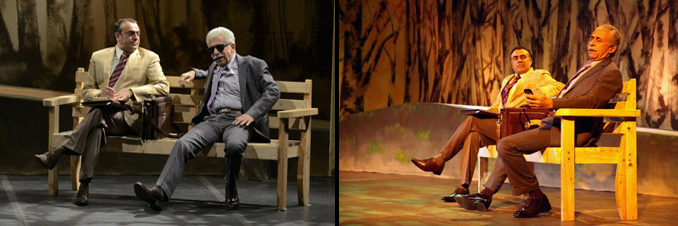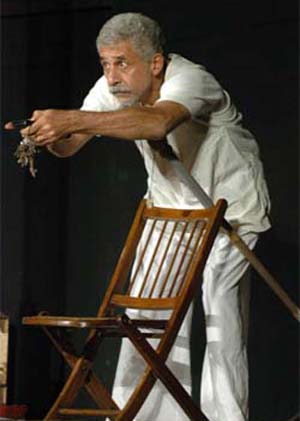Written by: Salma Chaudhry
Posted on: December 16, 2013 |  | 中文
| 中文
“One day, all these trees will be cut down and turned into negotiating tables.” The satire in this line was perhaps the crux of the story A Walk in the Woods performed at Alhamra, in Lahore. Ironically, the very road the theatre is located on, i.e. the Mall Road, has witnessed massive displays of banners and portraits to accord rousing salutations to leaders coming here for negotiations that have never yielded any results. Failed Negotiations: this was the theme of legendary actor Naseeruddin Shah’s latest stage performance in the cultural capital.
The news that Naseeruddin Shah and his theatre group, Motley Theatre, would be returning in December to the provincial metropolis of Punjab, on the invitation of the Faiz Foundation Trust, spread like wildfire. Shah was to grace the stage at Alhamra on the 5th of December and the tickets were sold out days before the curtain-up. The Hall was fully packed and the audiences, both young and old, waited in anxious anticipation of the star’s appearance.
The curtains went up exactly at 7:00, as two actors took to a dramatically designed stage. The play was an adaptation of Lee Blessing’s 1988 play A Walk in the Woods that revolved around the liaison between an American envoy and his Soviet counterpart just before the onset of the Cold War. But the story in this play centered on the dialogue between a sober Indian diplomat Ram Chinappa (Rajit Kapur), and his cynical Pakistani counterpart Jamaluddin Lutfullah (Naseeruddin Shah), which blooms over a period of six months, during their clandestine talks and walks together in the woods of Geneva, Switzerland. The play brought humour to a story that was analogous to the troubling India-Pakistan relations, touching upon sensitive themes with a touch of wit here and there. The relationship between the two diplomats was interesting with its subtle – and not so subtle – nuances, and the plot marked their struggle to reach a consensus on a proposal to “bring about peace and prosperity in the region.”
 |
Shah’s character was cynical, dapper and charming, good with words, and knew how to divert the subject matter. On the other hand, his Indian counterpart was straightforward, proper, isolated and devoted to the cause of a successful conciliation. Chinappa would try to bring Lutfullah back to the proposal but Lutfullah would strive to convince him to do some “Khurafati baatein (pointless discussion)” because according to him, “dialogues have never had and will never produce any results”. The two diplomats experience an array of sentiments throughout the play which was spread over four parts and their brilliant acting created an enchanted atmosphere in the auditorium where you could see the audiences absolutely immersed in the restrained and hard-hitting humour delivered with impeccable flair and grace.
Through blithe and moving scenes alike, the actors made the viewers laugh on one hand, and left them thinking about the shallow political resolve of the two governments on the other. The play was both entertaining and thought provoking, bringing out the best of two great actors.
 |
Motley’s second performance Katha Collage was due on the 7th and 8th of December and the same hall was thronged with people once again. The collage consisted of an anthology of narratives elaborating upon the theme of human relationships (and how they evolve); the first two stories Badebhai Sahab (Elder Brother) and Shatranj Ke Khiladi (Chess players) were penned by Munshi Premchand and the last, Sankraman, performed by Naseeruddin Shah himself, was by the writer Kamtanath. The three stories intertwined together didn’t have a direct correlation but they were all sly spoofs of the transition that human behaviors, as well as the relationships, undergo over the varying epochs and state of affairs. The notable fact about these performances was that the audience could relate to the characters at so many levels because of the inimitable sub-continental appeal to them. Shah’s performance was the highlight of the evening and by the end of it all, the Motley team got an earnest standing ovation from the crowd.
Naseeruddin Shah thanked the audience and the Faiz Foundation Trust, insisting that the peace efforts between India and Pakistan should endure. Referring to the scrumptious food of Lahore and the warmth of Lahoris, he said that visiting the city was always a reminder for him of why Lahore was known as the heart and soul of Punjab.
Both the Motley Group and the Faiz Foundation Trust must be eulogized for their efforts in bringing the Indian theatre to Pakistan. It is endeavors like these which give some hope that the two will one day realize the value of peace, as Faiz says in these beautiful lines:
Hum ke thehrey ajnabi itni madaraatoon ke baad
Phir banaingai aashnaa kitni mulaqatoon ke baad
Kab nazar main aaey ge be-dagh sabzey ki bahar
Khoon ke dhabbey dhulain gain kitni barsaatoon ke baad
You may also like: